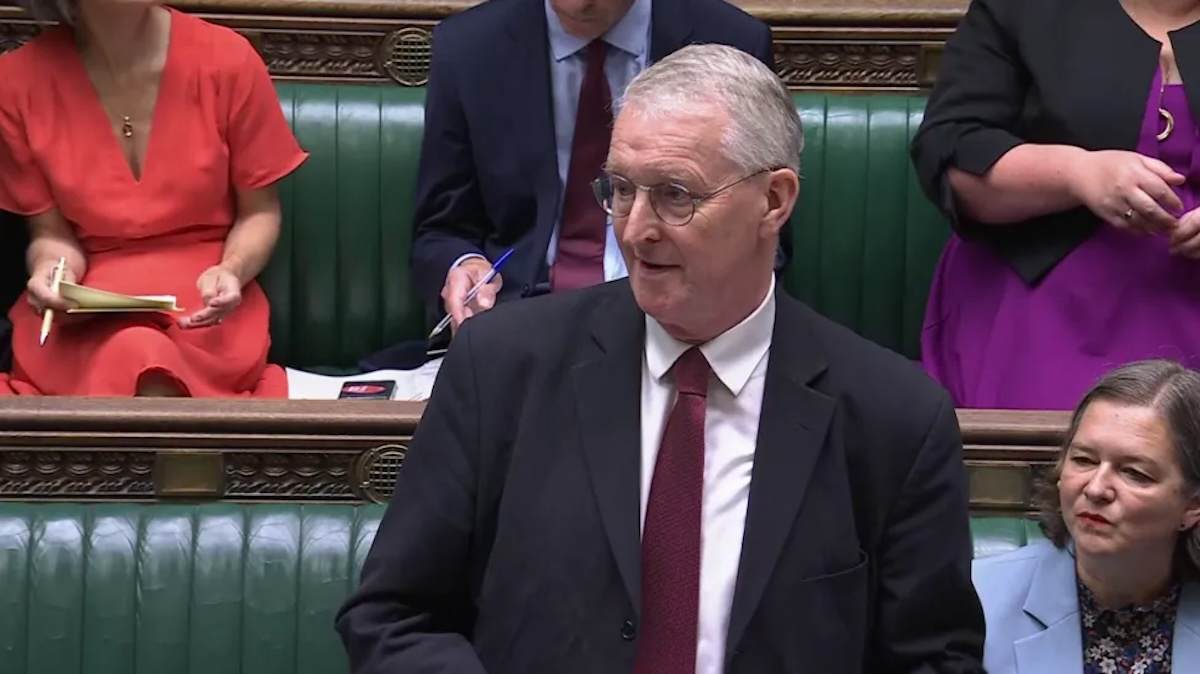
The British government has been criticised for coming up short as it unveiled its proposed amendments to Tory legislation on the legacy of the conflict in Ireland.
The act, which was brought in by the last London government, introduced a ban on inquests, civil actions and other investigations related to the events of the conflict prior to 1998. It also offered an amnesty for those who co-operated with a new ‘information recovery’ body.
Described by former British Prime Minister as “drawing a line” under the conflict, it was widely seen as an attempt by Britain to draw a veil over its role in war crimes and frustrate the demands for justice from its victims.
The Act has been opposed by victims’ groups and all the main parties in the North. Labour pledged to repeal it if they won the general election in July.
Speaking in the House of Commons on Wednesday, Hilary Benn (pictured) said he was laying a “remedial order” which would formally remove the conditional immunity clause from the Act and the ban on new civil actions.
Benn indicated the ICRIR ‘truth’ body (Independent Commission for Reconciliation and Information Recovery) would continue operating, and that he would bring forward legislation in response to recent court judgements to ensure it complied with the law.
But he said the government would legally challenge some aspects of a Court of Appeal judgement from earlier this year – including a ruling relating to London’s power to block the disclosure of embarrassing or incriminating information to bereaved families on the grounds of ‘national security’.
Benn said the government “will make further changes to reform and strengthen” the ICRIR’s “independence, powers and accountability.”
According to reports, the ICRIR made an arrest of an unidentified individual in connection with a conflict killing in the early 1990s this week, but no details have emerged.
A number of victims’ groups have continued to call for the shadowy body to be scrapped.
Prominent campaigner Raymond McCord, whose son Raymond Jr was beaten to death by a UVF/British gang in November 1997, said this week the body must be “abolished, not reformed or tinkered with”.
“We cannot allow a body, state agency or political agenda or narrative dictate on how or what justice will be.”
Sinn Féin MP John Finucane, whose lawyer father was assassinated by a British death squad in 1989, said Benn’s announcement falls short of Labour’s manifesto commitment to “repeal and replace” the act.
He called a number of the proposals “outrageous and disgraceful.”
“His main focus is on retaining and reforming the ICRIR in a vain bid to attract the support of families and victims rather than dealing with their genuine and well-rehearsed concerns,” Mr Finucane said.
“The Labour Party made a manifesto commitment to ‘repeal and replace’ the Legacy Act ‘by returning to the principles of the Stormont House Agreement’, this announcement falls far short of that,” he said.
“Instead, the British Secretary of State has focused on reforming the Independent Commission for Reconciliation and Information Recovery (ICRIR) which has been rejected by victims and families and the political parties.
“He intends to introduce a remedial order under the Human Rights Act which will enable all civil proceedings to resume and to introduce primary legislation to meaning inquests will be restored, starting with those almost completed.
“He said he will remove all the immunity provisions although these have already been disapplied by the Courts.
“Disappointingly he intends to appeal recent judgements in relation to the British Secretary of State’s ability to vet and redact family reports prior to their disclosure under national security.
“This is absolutely outrageous and disgraceful. It is essential in any democracy that judicial processes are free to carry out their duties independently, free from state interference.
“His main focus is on retaining and reforming the ICRIR in a vain bid to attract the support of families and victims rather than dealing with their genuine and well-rehearsed concerns.
“The British government should work with all families, the Irish government and the political parties on an agreed way forward for legacy by returning to the key principles and mechanisms agreed at Stormont House.”
![[Irish Republican News]](https://republican-news.org/graphics/title_gifs/rn.gif)
![[Irish Republican News]](https://republican-news.org/graphics/title_gifs/harp.gif)

